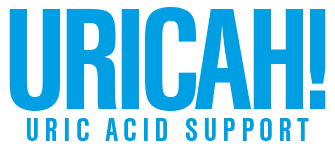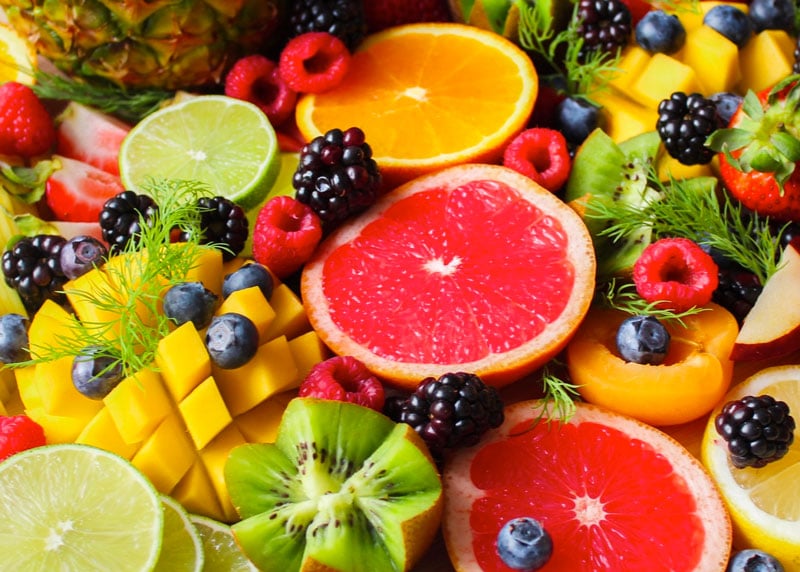Sugar is the enemy if you’re a gout sufferer.
When your body metabolises sugar, it increases the production of uric acid while at the same time limiting excretion through urine.
As any gout sufferer knows, when your body has an over-abundance of uric acid, it crystallises in the joints which is what causes gout attacks.
But avoiding sugar isn’t easy.
It’s found in many of the “healthy” food options which are recommended by doctors and marketed to us through TV advertisements.
How can you avoid consuming too much sugar if it’s hidden where you might least expect it?
Let me help you…
Fruit
Fruit = healthy.
Right?
Not necessarily…
Fruit is packed full of healthy nutrients such as Vitamin C, Potassium and Fibre.
However the thing that makes fruit taste delicious is also something gout sufferers need to avoid: fructose.
Fructose is a type of sugar and when your body breaks it down, purines are released. As these chemical compounds are broken down, uric acid is produced. Uric acid can form painful crystals in the joints which is the cause of gout.
Fructose can generate uric acid within minutes of being consumed.
So if something perceived as being healthy by the majority of people is actually a potential danger food for gout sufferers, you can imagine the frustration gout sufferers must feel when they are told simply “eat lots of fruit and vegetables”.
(Vegetables by the way are all fine – eat your heart out).
An interesting example popped up this morning on the Gout Control Advanced Facebook page.
Someone commented on one of our Facebook posts saying their husband who suffered from gout was a huge fruit eater.
After suffering from gout for years he cut back on fruit in a big way and has been gout free for two years.
It’s no surprise the reduction of fructose in his diet has seen a positive impact on his gout situation. Eating “huge” amounts of fruit would have caused a much larger than normal intake of fructose than what would be considered balanced.
“Fat Free” Foods
Sugar is especially nasty when it is added to so-called “healthy” foods you buy off the shelf.
A lot of people over-consume sugar as they are simply not aware how much is in their food. They see “fat-free” as being healthy, without realising that fat (which doesn’t actually make you fat) has been replaced by sugar.
“Fat-free” food is often laden with sugar because without fat, taste disappears. How do they put taste back in? Sugar!
Take milk for example.
Anchor Blue Milk, per 100ml, contains 3.4g of fat and 4.8g in sugars.
Anchor Trim/Green Milk, per 100ml, contains 0.3g of fat but 12.4g in sugars.
That’s nearly 3x the amount of sugar in the so called “healthy” option.
Now think about how much “trim” milk you might use per day:
- 100ml for your morning coffee
- 200ml for your morning cereal
- 50ml in your evening tea
Total: 350ml per day
350ml x 12.4g per 100ml = 43.4g of sugar!
The recommended daily sugar intake for a healthy adult is 30g of sugar. Even before you leave for work, you’ve probably consumed more sugar than you should be.
And that’s just milk.
Any food marketed as “fat free” or “low fat” will almost always feature more sugar compared to it’s “normal” counterpart.
Other “fat free” foods to watch out for: Yogurt, salad dressing, peanut butter, spreads, mayonaise.
Breakfast
Most pre-packaged breakfast cereals are absolutely jam-packed full of sugar.
There’s a reason why breakfast is the most marketed meal of the day: it’s habit forming (most people get up at the same time every day) and most people eat the same breakfast every day.
But there is another reason why it is habit forming: sugar.
Sugar is one of the most addictive substances on earth. It acts in a similar way to heroin, flooding the brain with dopamine (the pleasure hormone) which makes us want to perform the same behaviour again.
Scientists have used functional MRI (fMRI) scanners to show that the same brain regions are activated in response to cues and cravings for both sugar and drugs.
Some examples of sugar-laden breakfast cereals:
Kelloggs Nutri-Grain: 26.7g of sugar per 100g
Kelloggs Froot Loops: 38g of sugar per 100g
Kelloggs Just Right: 22.9g of sugar per 100g
These are all marketed heavily as a healthy start to the day, but consider what they’re really trying to sell you.
Drinks
Soda
Everyone knows soft drinks are full of sugar. Coke, Fanta, V – it doesn;t matter.
If it’s fizzy and sweet, one can will probably put you over your daily sugar intake.
Coca-Cola contains 10.6g of sugar per 100ml. That’s 35g in a 330ml can!
Sugar Free Soda
But what about “Zero” drinks such as Coke Zero, Coke No Sugar etc?
While these contain no sugar, they are sweetened with chemical sweeteners which can have a similar effect on the brain, encouraging you to seek out your next sweet fix.
Fruit Juice
Fruit juice may sound healthy, but even the “no added sugar” varieties contain large amounts of natural sugar (fructose) from the fruit.
For example 100ml of Just Juice Orange Juice contains 9.6g of sugar per 100ml. That’s almost as much sugar as a glass of Coca-cola!
A full glass of orange juice (200ml) would therefor amount to 19.2g of sugar.
There’s a reason why it’s so delicious…
Conclusion
Sugar – especially added sugar – should be heavily moderated by everyone – not just gout sufferers.
Unfortunately, sugar is found in many packaged and convenience foods as a way to market them as “fat free” or to increase their addictive qualities so buying them becomes an addiction.
The next time you pick up a product with a barcode, check the nutritional label and examine the sugar content.
Try and stick to less than 5g of sugar per 100g and limit your daily intake to under 30g of sugar per day. If you’re suffering from gout, cut that in half again.
Don’t over-consume fruit because you think it’s healthy. While there are benefits to fruit, stick to 1-2 portions per day to limit overall sugar intake.


Hello Ken,
Until I found your website I also was a fruit BAT! It’s only been a couple of weeks but boy have I noticed the difference in my joint pain, I’m now on celery seed 5000. Many thanks Jan
Wow, just read this article and it’s like an aha moment, most gout sufferers know about alcohol, red meats and seafood . I’m currently having an attack now , which is how i found this website. This attack is the worst I’ve ever had, it’s in my toes,ankle and knee of my right leg and in my left elbow at the same time, didn’t know it was possible. When i have an attack i usually increase my fruit intake thinking its safe, plus you have no appetite when you have gout pain. After reading this I’ll work on lowering my sugar intake and increase my exercise from nothing at the moment to 30 mins daily, hope my order turns up soon.
There is no doubt sugar is a major factor in my condition, also bread,I make my own, both are very addictive. I now have a choice, continue sugars and breads and suffer nearly daily gout, which is excruciating pain, making movement difficult and weight gain is a forgone conclusion. Time to make a concerted effort. Will advise on progress.Diet changes and Gout Capsules began yesterday.